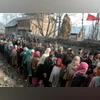Sporting a long Islamic robe and traditional Qarakul headgear, a religious scholar in Kashmir is wandering the streets of the area he lives in. His madrassa is located there.
This is not a routine matter relating to the madrassa. The impending elections have a bearing on it.
He’s Gul Mohammad Bhat, popularly known as Gul Azhari, a Janata Dal (United) candidate contesting from the remapped Anantnag West constituency in southern Kashmir, which is going to the polls on September 18. Having a doctorate in Islamic philosophy from the leading Al-Azhar University, Egypt, Gul runs a Sunni madrassa, which has nearly 80 students and has so far produced hundreds of preachers spread across the valley since its inception in 2013.
“It is high time Islamic leaders claimed Kashmir’s political space, cleaned the muck of traditional politics, and delivered on the trust of the people with integrity and commitment in line with Islamic values and ethics,” Gul Mohammad Azhari told Business Standard.
The delimitation of constituencies in 2023, criticised by regional parties, has, however, proved a blessing for new entrants like Gul. It has led to the consolidation of votes on religious lines as the places where his residential home and madrassa are located fall in the remapped Anantnag West constituency. Earlier, they remained divided between the Anantnag and Devsar Assembly segments.
Mosque sermons in Kashmir, for decades, have maintained a calculated distance from political topics. But the ongoing Assembly elections have given indication that the picture might be changing, as Gul and his two cleric supporters can be seen talking about participation in elections and support to Islamic scholars in the poll fray during their sermons.
Sarjan Barkati, in jail for alleged involvement in a “militant funding case”, emerged as a key figure of Kashmir’s widespread turmoil in 2016. His prominence, however, owes itself to his influence as a religious preacher associated with the region’s old Sunni seminary, Idara Tehqiqaat Islami. Later, however, he parted ways.
With his wife too behind bars on “crowdfunding charges” since last year, Barkati’s existential crises have plunged him into polls. He is contesting election independently from two constituencies, Ganderbal and Beerwah. Apparently inspired by Engineer Rashid’s son leading his (Rashid’s) election-winning campaign, Barkati’s 17-year-old daughter and 12-year-old son are behind the nomination and campaign — seeking votes for the release of their parents.
The Jamaat-e-Islami, a socio-religious organisation, is back in mainstream politics after 1987. In the 1970s, the Jamaat as a political party began participating in elections with its religious leaders as contestants. The organisation is facing a blanket ban since 2019 for its alleged anti-state stance and its participation in polls is seen as an attempt to prove its loyalty to New Delhi.
Shia Muslims, which command a significant vote share in some Central and North Kashmir pockets, have a history of voting for their clerics since the mid-90s. Unlike the Jamaat, their leaders have been with the Congress, NC, and PDP. In the ongoing Assembly elections, a few candidates of the community, including Molvi Imran Raza Ansari and Aga Syed Ahmad Moosvi, are in the fray from the Budgam and Pattan Assembly segments, which have traditionally remained their hotbeds.
Although there have been sporadic reflections of religion on Kashmir’s political landscape, largely the space has remained untouched, especially by Sunni religious leaders. However, the winds of change are blowing. Since 2019, major political shifts and a dip in armed violence have left Sunni leaders thinking of claiming their forsaken space in mainstream politics. “There’s no political leadership from religious leaders. On many instances like the banning of liquor and the establishment of Sheikh ul Alam University in Kashmir, my repeated efforts on the door of politicians found no ears. How long will we let our religion and identity be hijacked and played with by others,” Ghulam Rasool Hami, chief of Karwani Islami, a Sunni organisation, told Business Standard.
Credible sources told Business Standard in August around 13 religious leaders including Hami of Karwani Islami and Abdul Rashid Dawoodi of Tehreek Sout ul Awliya met in Srinagar to discuss the launch of a political front under the banner “Sunni World Forum” and decide on participation in polls. But the larger consensus emerged on delaying participation in the current elections.
Unlock 30+ premium stories daily hand-picked by our editors, across devices on browser and app.
Pick your 5 favourite companies, get a daily email with all news updates on them.
Full access to our intuitive epaper - clip, save, share articles from any device; newspaper archives from 2006.
Preferential invites to Business Standard events.
Curated newsletters on markets, personal finance, policy & politics, start-ups, technology, and more.
)